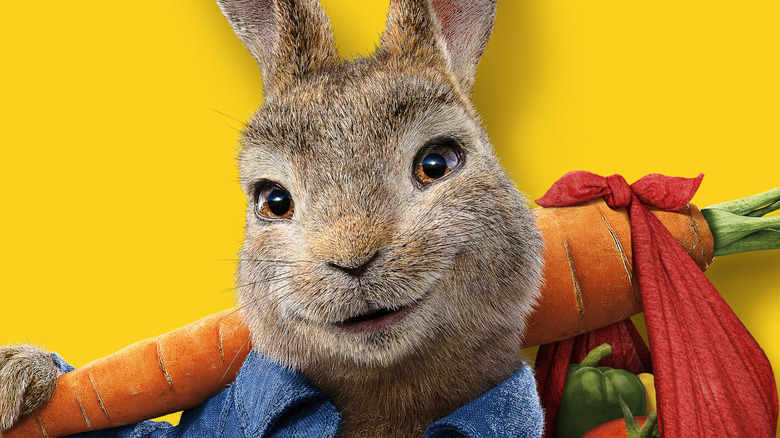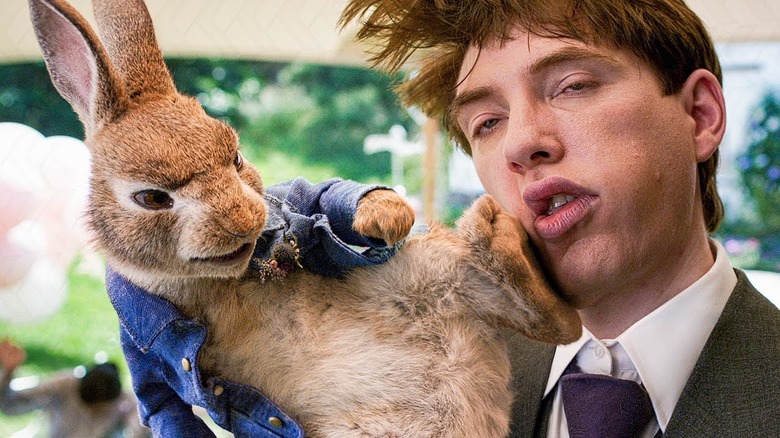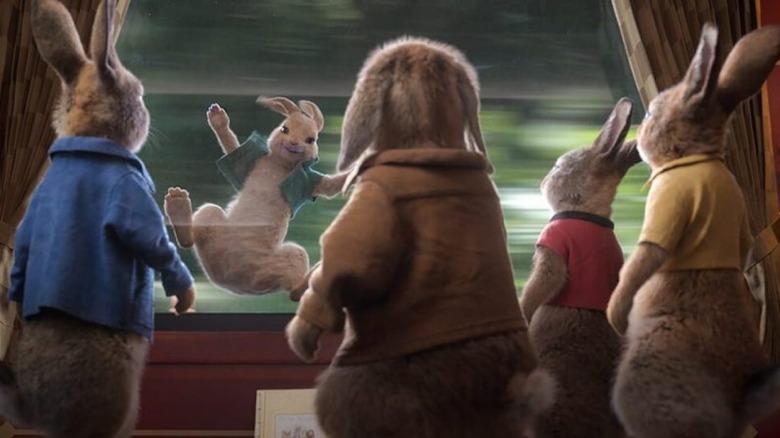Peter Rabbit 2 - The Runaway Review: No Funny From This Bunny
After being closed for nearly six months due to the second wave of the coronavirus pandemic, cinemas in the UK finally reopened on May 17. And after thousands of people flocked to see the highest-profile new release on opening day, "Peter Rabbit 2: The Runaway," it's a surprise the public didn't start petitioning the government to close them down all over again. Mercifully, this long-delayed sequel to the 2018 hit is ever so slightly better than its predecessor, but clearing the low bar of bettering the previous "Peter Rabbit" isn't too hard an achievement. Director Will Gluck's sequel boasts the most fourth wall-breaking narrative of any family franchise outing since "Gremlins II: The New Batch," and a handful of gags that actually land — which, in a film starring the grating vocal talents of one James Corden, is enough to make it surpass any low expectations.
Unfortunately, this meta narrative only works to the film's detriment, especially considering an entire story is built around the idea of a character's Peter Rabbit book getting adapted from a quaint British children's story into a soulless corporate franchise. It's a film self-aware about how it has reimagined the mischievous rabbit from its famous source material, but feels less like a middle finger to Hollywood producers than it does to the audiences paying to see it. Make no mistake, this is one of the most cynically minded blockbuster efforts in some time, taking every opportunity to point out that it is a mangling of the original stories while thinking that highlighting these flaws is all that it needs to do to work as a satisfyingly self-referential comedy. Families deserve better than this, and there's nothing in this sequel that helps Peter Rabbit escape from Paddington's shadow.
Breaking the fourth wall in the most annoying way
Picking up a couple of years after the last film, the sequel finds Thomas McGregor (Domhnall Gleeson) fully adapted to life on the farm and happily married to aspiring children's author/thinly veiled Beatrix Potter surrogate Bea (Rose Byrne). However, he still has a frosty relationship with the animals who once terrorized him — in particular, their ringleader Peter Rabbit (James Corden), who he still accuses of stealing food even as he's trying to get all the other creatures to follow the rules of the farm. Things start changing for the better when Bea's self-published children's book about the rabbits becomes a bestseller, attracting the attention of hotshot publisher Nigel Basil-Jones (David Oyelowo).
He loves the story, but in typical corporate fashion, demands the entire thing be changed so the rabbits are having more adventures in space and at sea, not just on a farm. And his biggest change is to reimagine Peter as more than just a mischievous spirit, but as the "bad seed," the villain he so clearly is. This gives Peter a crisis; he's finally up on billboards and getting attention for the first time, but as a mischievous character he doesn't want to be. So he runs away from his farmyard pals and meets the street rabbit Barnabas ("Fear The Walking Dead" star Lennie James), who enrolls him in criminal schemes, telling Peter to embrace his more mischievous side.
Most of the film's inspired comic material is the meta book publisher storyline that will likely go over the heads of younger viewers — however, inspired ideas on paper don't necessarily ensure funny results in action. This meta plot does eventually pay off in a knowingly silly grand finale where the vast majority of Nigel's recommended storylines for future rabbit adventures in Bea's books, from boat and ski chases to skydiving, all come to fruition in an increasingly ridiculous montage of the farmyard gang reuniting after getting split up. But this is the sole time when the meta jokes are more adventurous than characters breaking the fourth wall to point out the gag to the audience. At one point, a character cracks wise about the books being adapted into a film by a Hollywood director who doesn't understand the material, punctuated by a painfully unfunny shot of another character staring blankly at the audience like an "Office" reaction GIF.
Elsewhere, a reference to a "flashlight" has Peter Rabbit insisting the word "torch" be used so British viewers can understand it — a joke that might work on paper, but largely caused confusion at my screening, where a nearby child loudly asked if that meant the rabbits were all American. If this is a commentary on British pop culture being adapted by Hollywood filmmakers who don't understand it, then it's a clear failure: it looks every bit like the soulless corporate product it is criticizing, the self-awareness doing very little to hide the screenwriting laziness.
A charmless reinvention of a children's classic
Another big flaw is James Corden's lack of charm or comic timing as Peter. In the source material, Peter Rabbit has always been a mischievous character, but was likeable enough to become a beloved figure of children's literature that has endured for generations. Those qualities are not the same for Corden, and although this big-screen franchise does try to adapt Peter Rabbit so it's a better fit for his comic persona, his reimagining as an egotistical, consistently wisecracking character proves less than endearing. When Oyelowo's character points out that he imagines the rabbit to have an annoying voice, it's hard not to nod in agreement — a joke that falls flat because Corden then puts on a different, more high-pitched voice to claim he isn't annoying, the actor's ego presumably bruised after seeing the screenplay point out that audiences find the very sound of his voice insufferable.
It's hard not to think of these Peter Rabbit adaptations in tandem with the recent Paddington films, another case of a classic British children's story leaping to the big screen for a modern audience. But those films worked because they never tried to reimagine the character to fit a star persona, with director Paul King even going so far as to replace Colin Firth as the voice of Paddington just weeks before release because his famous voice proved too distracting. It's a noticeable counterpoint to "Peter Rabbit 2: The Runaway," a watered-down reimagining of Beatrix Potter's tales designed as a James Corden family comedy franchise, not as a faithful modern day adaptation.
There are some bright spots in this Peter Rabbit sequel, with the overqualified live-action cast all doing their best to sell material that is clearly beneath them. David Oyelowo is having the time of his life as an overblown parody of an entertainment executive, while nobody commits as hard to being attacked by CGI animals as Domhnall Gleeson. Their efforts do prove futile — they may understand the assignment, but there's little they can do to elevate a screenplay that is so rarely funny to begin with. But the moments that do work are the ones when they are onscreen, giving more to their performances than the lazy screenplay requires from them.
It probably comes as no surprise that "Peter Rabbit 2: The Runaway" is a mostly charmless affair, a step up from the original in terms of comic ideas but not when it comes to the lazy execution. In a world where Paddington Bear can spawn a faithfully adapted big screen franchise that rivals "Citizen Kane" in critical respect, why does this children's book series need to be transformed into a deeply annoying set of James Corden vehicles?


